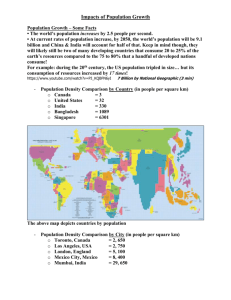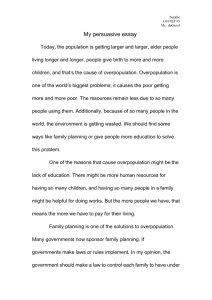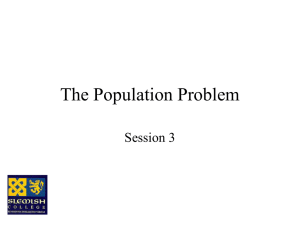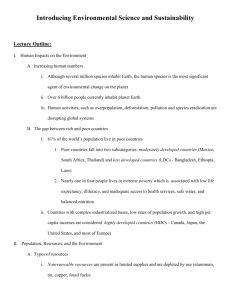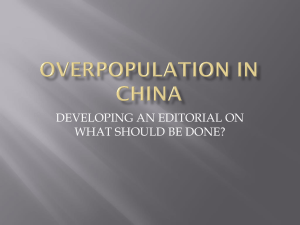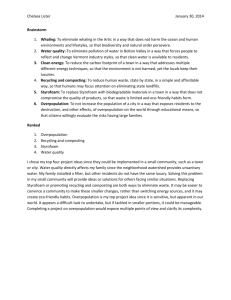Overpopulation FAQs - World Overpopulation Awareness
advertisement
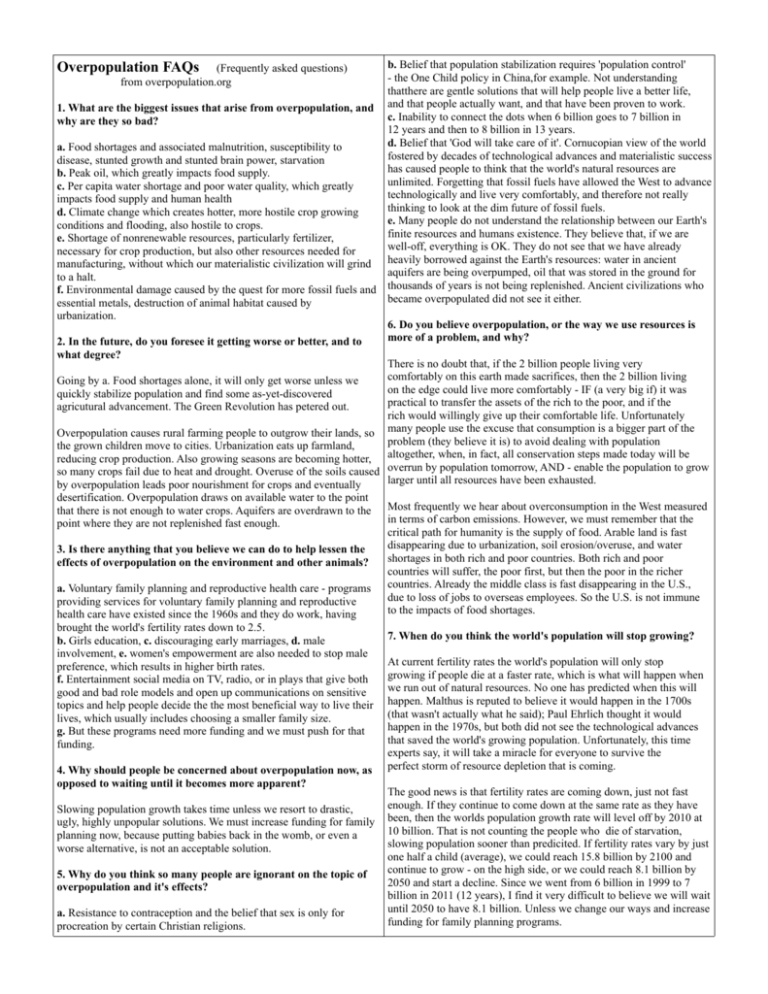
Overpopulation FAQs (Frequently asked questions) from overpopulation.org 1. What are the biggest issues that arise from overpopulation, and why are they so bad? a. Food shortages and associated malnutrition, susceptibility to disease, stunted growth and stunted brain power, starvation b. Peak oil, which greatly impacts food supply. c. Per capita water shortage and poor water quality, which greatly impacts food supply and human health d. Climate change which creates hotter, more hostile crop growing conditions and flooding, also hostile to crops. e. Shortage of nonrenewable resources, particularly fertilizer, necessary for crop production, but also other resources needed for manufacturing, without which our materialistic civilization will grind to a halt. f. Environmental damage caused by the quest for more fossil fuels and essential metals, destruction of animal habitat caused by urbanization. 2. In the future, do you foresee it getting worse or better, and to what degree? b. Belief that population stabilization requires 'population control' - the One Child policy in China,for example. Not understanding thatthere are gentle solutions that will help people live a better life, and that people actually want, and that have been proven to work. c. Inability to connect the dots when 6 billion goes to 7 billion in 12 years and then to 8 billion in 13 years. d. Belief that 'God will take care of it'. Cornucopian view of the world fostered by decades of technological advances and materialistic success has caused people to think that the world's natural resources are unlimited. Forgetting that fossil fuels have allowed the West to advance technologically and live very comfortably, and therefore not really thinking to look at the dim future of fossil fuels. e. Many people do not understand the relationship between our Earth's finite resources and humans existence. They believe that, if we are well-off, everything is OK. They do not see that we have already heavily borrowed against the Earth's resources: water in ancient aquifers are being overpumped, oil that was stored in the ground for thousands of years is not being replenished. Ancient civilizations who became overpopulated did not see it either. 6. Do you believe overpopulation, or the way we use resources is more of a problem, and why? There is no doubt that, if the 2 billion people living very comfortably on this earth made sacrifices, then the 2 billion living on the edge could live more comfortably - IF (a very big if) it was practical to transfer the assets of the rich to the poor, and if the rich would willingly give up their comfortable life. Unfortunately Overpopulation causes rural farming people to outgrow their lands, so many people use the excuse that consumption is a bigger part of the problem (they believe it is) to avoid dealing with population the grown children move to cities. Urbanization eats up farmland, reducing crop production. Also growing seasons are becoming hotter, altogether, when, in fact, all conservation steps made today will be so many crops fail due to heat and drought. Overuse of the soils caused overrun by population tomorrow, AND - enable the population to grow larger until all resources have been exhausted. by overpopulation leads poor nourishment for crops and eventually desertification. Overpopulation draws on available water to the point that there is not enough to water crops. Aquifers are overdrawn to the Most frequently we hear about overconsumption in the West measured in terms of carbon emissions. However, we must remember that the point where they are not replenished fast enough. critical path for humanity is the supply of food. Arable land is fast disappearing due to urbanization, soil erosion/overuse, and water 3. Is there anything that you believe we can do to help lessen the shortages in both rich and poor countries. Both rich and poor effects of overpopulation on the environment and other animals? countries will suffer, the poor first, but then the poor in the richer a. Voluntary family planning and reproductive health care - programs countries. Already the middle class is fast disappearing in the U.S., due to loss of jobs to overseas employees. So the U.S. is not immune providing services for voluntary family planning and reproductive to the impacts of food shortages. health care have existed since the 1960s and they do work, having Going by a. Food shortages alone, it will only get worse unless we quickly stabilize population and find some as-yet-discovered agricutural advancement. The Green Revolution has petered out. brought the world's fertility rates down to 2.5. b. Girls education, c. discouraging early marriages, d. male involvement, e. women's empowerment are also needed to stop male preference, which results in higher birth rates. f. Entertainment social media on TV, radio, or in plays that give both good and bad role models and open up communications on sensitive topics and help people decide the the most beneficial way to live their lives, which usually includes choosing a smaller family size. g. But these programs need more funding and we must push for that funding. 4. Why should people be concerned about overpopulation now, as opposed to waiting until it becomes more apparent? Slowing population growth takes time unless we resort to drastic, ugly, highly unpopular solutions. We must increase funding for family planning now, because putting babies back in the womb, or even a worse alternative, is not an acceptable solution. 5. Why do you think so many people are ignorant on the topic of overpopulation and it's effects? a. Resistance to contraception and the belief that sex is only for procreation by certain Christian religions. 7. When do you think the world's population will stop growing? At current fertility rates the world's population will only stop growing if people die at a faster rate, which is what will happen when we run out of natural resources. No one has predicted when this will happen. Malthus is reputed to believe it would happen in the 1700s (that wasn't actually what he said); Paul Ehrlich thought it would happen in the 1970s, but both did not see the technological advances that saved the world's growing population. Unfortunately, this time experts say, it will take a miracle for everyone to survive the perfect storm of resource depletion that is coming. The good news is that fertility rates are coming down, just not fast enough. If they continue to come down at the same rate as they have been, then the worlds population growth rate will level off by 2010 at 10 billion. That is not counting the people who die of starvation, slowing population sooner than predicited. If fertility rates vary by just one half a child (average), we could reach 15.8 billion by 2100 and continue to grow - on the high side, or we could reach 8.1 billion by 2050 and start a decline. Since we went from 6 billion in 1999 to 7 billion in 2011 (12 years), I find it very difficult to believe we will wait until 2050 to have 8.1 billion. Unless we change our ways and increase funding for family planning programs. 8. What do you think is the main factor/factors contributing to overpopulation? Lack of education and economic opportunity for women; authoritarian households where women don't have a say about their own lives, their health care or how many children they have; child marriage; lack of maternal health care for women; cultural beliefs in rural areas that say many children are needed to take care of the land, not realizing that too many children will outgrow the land; male preference; contraceptive inaccessability; lack of educational opportunities to learn that smaller families are healthier and more economically feasible. 9 How does overpopulation effect a countries economy? Overpopulated countries cannot build sufficient infrastructure or provide sufficient services for its population because there is too much competition for natural resources for people to earn enough to support a government. Over 2 billion people earn less than $2 a day. When a population is growing, however - not yet overpopulated, and there is a high ratio of young people, and opportunities are available for these young people to become educated and have jobs, then an economy will boom. However, when these young people are old, and they will have likely lowered their fertility rate, then there will be more older people than young people, and the economy will suffer. On the other hand, if the country reaches a point where resources in the area are exhausted, and the country cannot buy its resources from other countries, then the country is overpopulated, and poverty will be the result. 10. Why do the most populated countries have their high populations? High populations result when death rates are brought down while fertility rates remain high. Sanitation, pumping of aquifers, modern medicine, better ways of treating sick infants, and the Green Revolution have brought down mortality. Without a corresponding drop in fertility, population will grow. 11. Are there any solutions to end starvation? The UN claims that farmers in Africa can be be taught better farm management. Africa is where the highest growth is. It remains to be seen if this will be enough to end starvation. 12. What types of diets have the least environmental impact? Diets which use plants instead of animals; animals are ok if they feed on land or in water that cannot be used for crops. Some plant diets are better than others, using less resources. 13. Is overpopulation a problem that we need to be worrying about? Yes, overpopulation is like a runaway train, and the longer we wait to do something about it, the harder it will be to deal with the impacts. 16. In what areas of the world is overpopulation having the biggest effects and how? China, and India are seeing the biggest effects, mostly because of water shortages and deforestation. Africa will soon follow, particularly northern Africa where there is not enough water. 17. Have you been able to see the effects first hand? If so, what is it like? I have seen deforestation in Nepal and Ethiopia. People have to walk further and further to find firewood. In Nepal they climb up in trees and chop out branches to feed the leaves to their buffalo and the wood fuels their fires. The trees look all mangled. In Ethiopia, people have to walk 3-4 miles for wood to fuel their stoves. In the 1980s in the U.S. I noticed how crowded the roads had become, whereas, 20 years before my family could go camping in the woods just about anywhere, we now had to make a reservation to camp. I started to become involved after my trip to China in 1995 where I noticed that the farmland I flew over had a whole village for every 40 100 acres, but in the U.S. there would be just one farmhouse for the same amount of land. And there were no vacant lots in cities like Shanghai – every space was taken. 18. How does overpopulation differ here in the United State compared to other countries? Overpopulation in the U.S. affects the world because the U.S. population exceeds its carrying capacity, getting many of its resources from other countries, often taking advantage of the poverty in the other countries by paying much less than the resource is worth. 19. When do you feel overpopulation will grow to where it is affecting the lives of people all over the world? It already is. The current economic crisis is due to our oil-based, debt-based economy having built up a large bubble and now it has burst. In addition, food prices are rising and some people cannot afford to buy sufficient food to feed their family. 20. What can people like me, an eighteen year old, do to help? You can join an activist group, or do tabling alone if you can't find a group. You can educate yourself on the subject and all the arguments and issues on the subject (I hope my website will help you there), and participate in letter writing and leaving comments on online newspaper articles about population. You can find WOA's Facebook page (World Overpopulation Awareness), and share your activist activities with us there. You can look up Population Connection, and find suggestions of what to do there (one of them is making presentations to school teachers, who take the lesson to their students). You can hook up with the Sierra Club and join population activities there: http://www.sierraclub.org/population/ 21. Why don't we hear much about this issue on the news and such? It seems like something that should be dealt with 14. What is the biggest effect of overpopulation? immediately, yet I don't see anyone in power taking action. The United States and other countries HAVE been taking action on this The most drastic impact so far is food shortages, with one billion issue for many years. Programs are in place for voluntary family people classified as 'undernourished' by the World Health Organization planning and reproductive health, among others that reduce fertility (WHO) in 2009, and nearly a billion undernourished in each of 2007, rates. These programs have been instrumental in bringing down world 2008, and 2011. 3 billion people in the world today struggle to fertility rates, which are now around 2.5 children per woman. But survive on US$2/day, and food prices are rising. every year there is a battle over how much funding should be put into these programs by the U.S The second and third impacts of overpopulation are Peak Oil and Climate Change. Some will argue that climate change is not man made, ~~~ but it is indeed happening and causing crop failures. The world is This article may be copied freely, in whole or in part. Reference to producing less oil today than it did last year, and this trend will its source, overpopulation.org, would be appreciated, but only without continue. Both peak oil and climate change result in less food to feed significant modification of any wording in the text. the world, peak oil because food depends on mechanized farm machinery and transport.
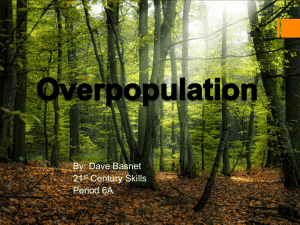
![[标签:标题]](http://s3.studylib.net/store/data/007514640_1-d06ca384d6a6efac05ae8c0c925f8675-300x300.png)
